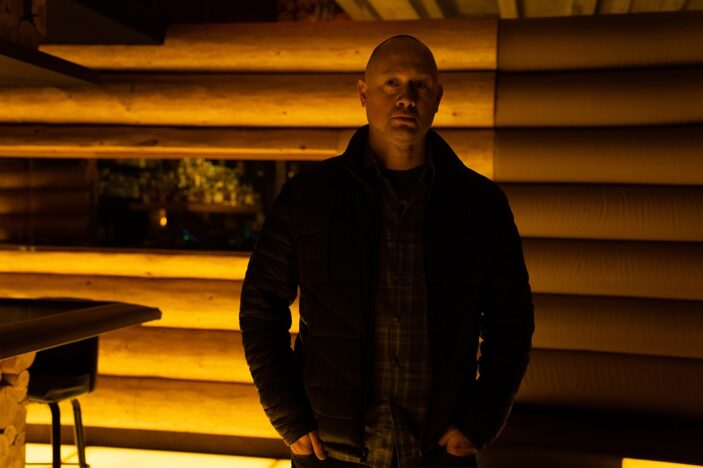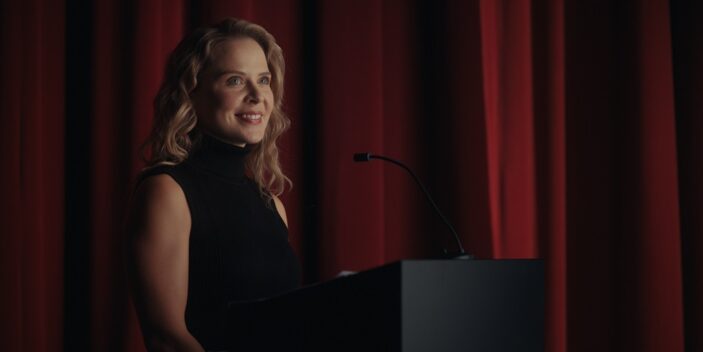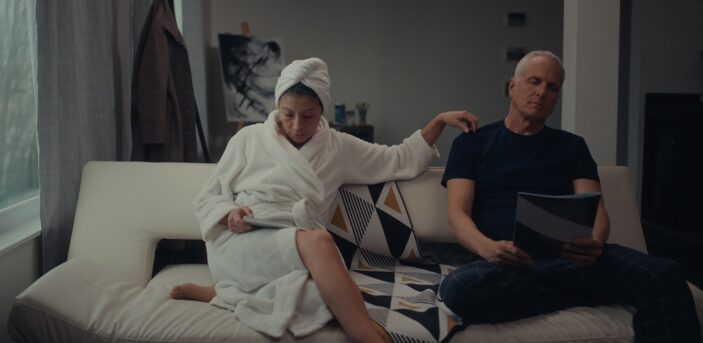
A moving debut feature film from Seattle filmmaker Ian Ebright, The Way We Speak is a modern day cautionary tale.
Headlined by 2023 Screen Actors Guild Awards nominee Patrick Fabian (Better Call Saul), the compelling drama (you can read our full review here) centres on an up-and-coming writer who refuses to leave the spotlight when his best friend and debate opponent suffers cardiac arrest, leading to an obsession over his new opponent (Kailey Rhodes) and a growing rift with his ailing wife (Diana Coconubo).
Following a successful festival run at the Florida Film Festival, RiverRun Film Festival and the Julien Dubuque International Film Festival (where the film claimed a top prize), The Way We Speak is now available on digital and on-demand platforms in the United States and Canada. To coincide with this release, Peter Gray spoke with the creative collective about the origins of the film’s story, the cast’s first impressions of the script, and how they formed such a unique bond on screen.
Congratulations on the film. First for you, Ian, where did the idea of The Way We Speak originate?
Ian Ebright: Part of it is being in a house with two women. Our daughter just moved out, she’s 20 and living a few minutes away in her first apartment, which is terrifying for me as a dad. I think one of the only things we do as writers is we perceive ourselves in the world around us. Around that 2019 mark it was a very tumultuous time in the nation, and in the house I was listening to the news and almost taking on the challenge of “What’s okay for me to say?” You know?
I’m always interested in making things where I feel like I can actually contribute something. In a weird way, I almost think, we’ve seen the world as (the show) Mad Men. It’s a great show. (But) we’ve seen these examples of men reclining, enjoying their cigarettes, and women fetching coffee. Ultimately, I’m more interested in what is interesting rather than what is correct. And what seemed interesting was inverting that to where we would have this almost stunted boy of a man surrounded by successful women, and we could explore some of these timely elements in a way that was careful and multifaceted. It’s rooted in character. We never wanted to take the cheap shot of grandstanding, which is a little ironic in a film that’s literally on a debate stage. But it was fun to set the table and throw a lot of misdirection at the audience.
To Patrick, Diana and Kailey, what’s your first reaction to a script like this? Is it the subject matter? Or are you taken with the sheer amount of dialogue?
Patrick Fabian: I don’t see scripts like this very often. There’s mountains of pages where all of a sudden one character is just delivering a monologue. And nobody gives that luxury space out. It’s exciting as an actor. It’s also frightening, because you’re thinking about keeping the interest. What is being said throughout that’s hiding a throughline? Sometimes it’s illuminating, and sometimes it’s a mask to get away from what (my character) is trying to say. You want to have it both ways.
For a lot of the stuff that (my character) Simon said, and Ian and I joked when we first met, I wasn’t sure what it’s about, but I know it’s about something, and I want to be a part of that. I want to be a part of illuminating that. And what was great about working on (the film) was that my ideas, my pre-conceived notions of what Simon is, immediately ran up against what I saw on the page with Diana playing my wife and Kailey as my competition.
My small, little reptile male brain could only go so far in expanding it. And I see these ladies and they are these formidable opponents and pillars that I get to anchor both my emotional stability on as a human and as an actor. I tip my hat to them, because they propped me up.
Diana Coconubo: The amount of time I had was very, very limited. It was a very quick turnaround from the moment of getting the breakdown notice. I mean, the first thing as an actor you look at is who the director is. You do a bit of research on that, and then I was interested. I’d also never been to Portland, so that was cool too. At the time I was in New Hampshire, and it was around the holidays, so I had the time to skim the script. I think it was three scenes, and they were pretty emotionally heavy. It was exciting. And like Patrick said, also “Holy shit, am I going to be able to do this?”
As an actor, the only thing you rely on is your training and your technique. If you’re lucky you can get a quick coaching session in, and you just have to really rely on what you know about the character and your own instinct in those moments of the auditions. When you’re auditioning on Zoom, there’s a lot of elements that are challenging. We are mostly auditioning through self tape, but these were live auditions.
Kailey Rhodes: I didn’t get to see the whole script. I just saw the side that was assigned to my character, and it was a debate side. I was thinking the whole movie are these small monologues! I thought (the film) was like a play, and that’s my background, so I knew how to do this. My audition for (my character) Sarah was a lot snarkier. She was a lot snarkier than how she ended up being in the film. It was quite hilarious, because my husband, who is this giant sweetheart, like a Care Bear, he was reading as Simon. As I was reciting I kept cutting to ask him if he could be just a tiny bit more of a dick (laughs). Then when I saw the full script, it was like, “Oh, this is just the motif, and by no means the meat of the show.”

One of the things I loved about this was how much isn’t said when it comes to the characters and their relationships. This is a question for everyone, was there ever a discussion had on the backstories of these characters? Or was it something that was formed more organically as you were working together?
Kailey Rhodes: I’ll jump in with Sarah. A big part of my family is very Evangelically Christian, and a big part of my family is not. So I feel like I live at an intersection of being very close to (Sarah’s) reality and observing that reality. Therefore I was able to bring a groundedness to her. What felt real for me is a human being trying to be an Earthly representative of a cosmic deity is a losing game. You are going to fuck up, and how much Sarah had accepted that reality was really interesting to me. As a woman, as a public figure, as a Christian, as a short woman, a white woman, a pretty, privileged woman…what did she have to accept about being this representative of a whole faith? She really reckoned with the fact that when you start on a pedestal that high, there’s only one way to go. And that’s down.
Ian Ebright: When you say backstory, I kind of draw a blank. But I think it’s a credit to these actors. We were really fortunate to just have this rapport from one person to the next. You really can’t deduce that stuff in the auditions, especially in an indie film where we’re just flying. We had so many serendipitous things, which is, first and foremost, the talent and intellect of these three.
My dopey analogy is fruit salad. Like, you want these very different flavours that blend well together. And our casting director, Dea Vise, and myself and the producers, we want those flavours to go well together, but you never really know. Then when you get there on day one, and you’ve done the smart thing of going out to get dinner the night before, you have that rapport and that, to me, is the backstory. I think the whole framework collapses if you don’t feel the credibility.

That was what was so great about watching you, Patrick and Diana. As much as your characters were existing in this tension, you sensed so much love for each other.
Diana Coconubo: I think as artists, you come into a production and you don’t know anybody, but everybody here was incredibly welcoming. The truth is, I didn’t know Patrick Fabian, but you look at his IMDb and you’re like, “Holy…what?” This guy is going to be my co-star? And we have to kiss? That is crazy. But he was just so nice. He took me hiking outside of Portland, and it was things like that that I think really feed into the chemistry that ultimately the camera is able to pick up. As an individual actor you do a lot of homework, at least that’s my process. It can be time consuming, but it helps when you’re battling all the elements that can come during production. You don’t always have the time to really prep your work and lay it out, so the foundation and the structure has to be there.
Patrick Fabian: Yeah, to Ian’s point, Diana and I had dinner the night before, and we just talked and learned each other’s stories a little bit. So there’s that fresh feeling of “Oh, I just met a new person.” It’s a real Kiki moment. It’s always nice to meet new people and hear about new stuff, and you project all this positive stuff. There was an openness and a trust. I felt like we both knew to be there for each other.
The Way We Speak is available now on Digital and on Demand platforms in the United States and Canada. An Australian release is yet to be determined.
